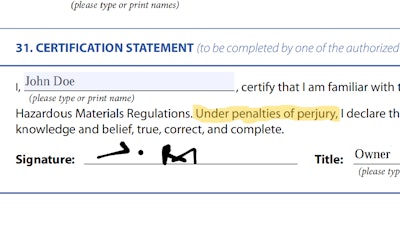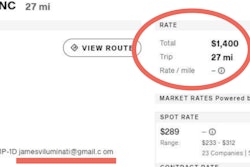
When completing initial Federal Motor Carrier Safety Administration registration and applying for operating authority or adding additional authorities, every broker and carrier applicant has faced a variation on a severe written warning like the following one, language included on the OP-1 application for authority:
I [your name here] verify under penalty of perjury, under the laws of the United States of America, that all information supplied on this form or relating to this application is true and correct. Further, I certify that I am qualified and authorized to file this application. I know that willful misstatements or omissions of material facts constitute Federal criminal violations punishable under 18 USC 1001 by imprisonment up to 5 years and fines up to $10,000 for each offense. Additionally, these misstatements are punishable as perjury under 18 USC 1621, which provides for fines up to $2,000 or imprisonment up to 5 years for each offense.
FMCSA's MCS-150 form, required to be filed by carriers every two years, offers similar language, though without explicit reference to penalties. These warnings about perjury penalties have failed to deter what's been described as a freight fraud crimewave among an unknown percentage of the 800,000 or so FMCSA-registered entities, carriers and brokers alike. Could that be because FMCSA has never referred anyone to the Department of Transportation Office of Inspector General for perjury?
A recent bill introduced in the House would clear legal hurdles for the Federal Motor Carrier Safety Administration to impose $10,000 civil penalties on registered entities that violate its commercial regulations and actually enforce the rules on the books and penalize bad actors. If the proposed legislation became law, FMCSA could more readily assess fines for acts of dishonesty, like not disclosing ties to other carriers or brokers.

Yet its own forms already promise to seek fines of that exact same amount for misstatements or omissions of material fact, and asks the applicant to sign and verify they're aware of that.
[Related: Does FMCSA's registration-overhaul push have a sole-proprietor problem?]
Given the rise of fraud in recent years, so often facilitated by dishonest or incomplete registrations for authority to haul or broker in interstate commerce, we asked FMCSA if it's ever actually pursued a perjury case, or if it's simply an idle threat. FMCSA certainly knows of double brokers who failed to disclose their ties to other carriers or brokers and used improper principal place of business addresses, like the double broker whose scam prompted FMCSA to compel Uber Freight into revealing the rate a shipper paid to move a load.
Here's what FMCSA Office of Communications Director Cicely Waters had to say about perjury:
FMCSA coordinates with the Department of Transportation Office of Inspector General in cases of potential criminal violations, including incidents of false statements or willful misrepresentations. FMCSA is not able to provide information about possible criminal investigations. Within the Agency’s enforcement authority, FMCSA is able to revoke or suspend registration, through an administrative proceeding, in some cases where there is sufficient evidence that an entity submitted false or misleading information on an application for registration.
Asked if FMCSA has ever referred to DOT OIG a case of perjury, as their own forms suggest they would, Waters said "FMCSA has referred cases involving the provision of false information on registration forms to the DOT OIG."
One last time, how about perjury, as mentioned on your forms specifically -- any referrals for that?
FMCSA indicated that its legal team doesn't believe perjury, specifically, would apply to false information required on the form. The cases FMCSA have referred to DOT OIG "are usually considered under a federal statute that prohibits 'false statements,' which is broader and would catch things like false information on a form," the agency indicated.
Just as FMCSA cites a 2019 Department of Transportation Administrative Law Judge ruling as removing their authority to assess $10,000 civil penalties for violations of commercial regulations and registration requirements, though they are indeed codified regulations, here it seems there's a way out of enforcing rules on the books.
At once, FMCSA noted it reviews all applications for operating authority for conformity with FMCSA’s statutory and regulatory requirements for registration, and that applications that fail to satisfy those requirements can be rejected -- approximately 60-70 each month don't meet FMCSA's criteria and get rejected.
[Related: Fighting the trucking fraud networks in FMCSA's registration system]













